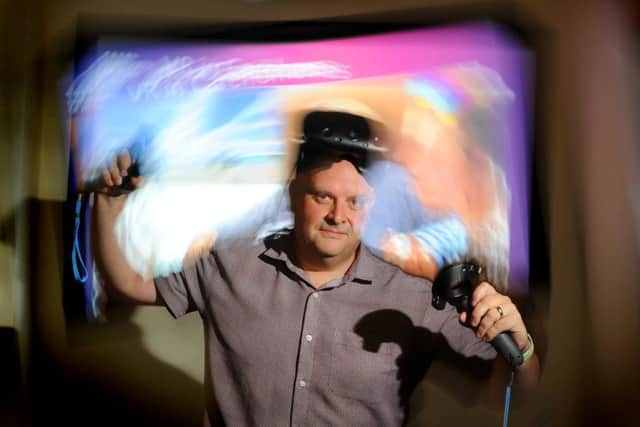How virtual reality gaming can help people living with dementia
An elderly lady, Mary, is visibly distressed as carers help her to a seat.
“Oh my God”, she repeats, shaking. Staff comfort her and she is helped into a virtual reality headset. “Ooh look at it,” she says, as a beach scene, complete with donkey and sandcastle come into her view. In a matter of minutes she’s singing. “Ooh I do like to be beside the sea”, she blurts out, giggling.
Advertisement
Hide AdAdvertisement
Hide AdThe impact the software has on her is clear to see in a video shared on Youtube, which aims to show how virtual reality system ImmersiCare can improve the wellbeing of those living with dementia.


“This is so beautiful”, another lady, who is not named, says as she too explores the virtual seaside. “I’m just so happy,” she says, shedding tears and describing the experience as “magic”.
The software, which transports people in an alternative, virtual world, has been used as a form of therapeutic engagement for residents with dementia, in a partnership between Immersicare and UK care home group Quantum Care. “The effect is unique to each individual resident, but has an overwhelmingly positive effect on the majority of residents’ well-being and has helped carers and residents connect to each other in the sharing of experiences and memories,” a statement on the company’s website says.
The immersive environment can trigger memories and spark conversations about what the person is seeing, explains Jason Hayhurst a lecturer in digital media at the University of Hull. “We could be helping people to keep that cognition going as they get more elderly.”
Advertisement
Hide AdAdvertisement
Hide AdMr Hayhurst has been researching how virtual and augmented reality games can be used to improve the quality of life for people with dementia.


It is his goal to develop a game for people to use on phones and tablets in their own homes with the aim of stimulating memories and reducing depression and anxiety. He wants it to be customisable so that family and friends can embed personalised memories and hopes one day GPs will be able to prescribe it as a “digital medicine”.
“This isn’t a solution to the whole challenge of having dementia,” he says. “But it is looking specifically at can this be used as a means of reducing depression and anxiety in the home for those because if their quality of life feels greater then they may decline less quickly and therefore not have to go into a care home as soon.”
Describing his planned game, he says: “It’s a form of digital therapy to encourage reminiscence and reduce anxiety and depression.”
Advertisement
Hide AdAdvertisement
Hide AdMr Hayhurst, 46, from Bridlington is no stranger to the symptoms of dementia, having seen the impact of Alzheimer’s on one of his relatives.
“Through a close family member, I recognise the challenges of repeated short term recollection of events,” he says. “But also the value to us both in reminiscing over long term activities that clearly animate and engage the two of us.”
“It drives me on to see if I can create something that may help,” he adds.
The academic, who has nearly 30 years of experience in the software development industry, was also spurred on by a student project several years ago, in which a virtual experience was created to try and simulate life with dementia.
Advertisement
Hide AdAdvertisement
Hide Ad“It got me quite interested in the technology that is being used to help people, which is ultimately why I wanted to come to university from industry really,” says Jason. “I want to be very much involved in what’s coming next and if I can help people with it, then even better.”
Virtual reality is already being used across the world to help people with dementia, and to give friends, family member and carers an insight into what everyday life can be like for those with the condition.
‘A Walk Through Dementia’, a VR app developed by Alzheimer’s Research UK, features three everyday situations - a supermarket, a street and a home - and is designed to demonstrate the challenges they can present.
“Dementia is commonly misunderstood, so A Walk Through Dementia is designed to offer the public a clearer picture of the challenges that people living with the condition face in everyday life,” Hilary Evans, chief executive of the charity, said at the time of its launch in 2016.
Advertisement
Hide AdAdvertisement
Hide Ad“The app also gives a poignant insight into the emotional impact of symptoms, an element that people with dementia told us was important to achieve. Although each person with dementia experiences the condition differently, and it would be hard to recreate the full range of complex symptoms, harnessing new technology like virtual reality helps us engage people with the impact of dementia on a new level.”
Two years ago Mr Hayhurst’s research took him to Australia, where too gaming technology is used to show life through the eyes of people with dementia. There, those living with the condition, can also immerse themselves in ‘The Virtual Forest’, changing seasons with a clap of the hands and moving animals with a wave.
The virtual reality experience, using gaming technology, is designed to improve quality of life through “engaging, empowering and explorative activities that encourage communication”.
Closer to home, The Wayback virtual reality app, gives a flavour of what life was like on the Queen’s coronation day in 1953, taking viewers back in time to try and trigger memories and spark conversations. And its developers hope to create a series of films featuring historic moments from across the decades, as a “virtual reality memory bank”. Back in Hull, Mr Hayhurst’s next steps will be to create a prototype of his game to trial so he can understand more about how it could help and how it could be tailored to each person for use in their own home.
Advertisement
Hide AdAdvertisement
Hide Ad“If [technologies] are geared towards the individual so that they are personal then that’s great because the individual can relate much more strongly,” says Gill Gregory, an advanced occupational therapist at Humber Teaching NHS Foundation Trust.
Mrs Gregory, who visits people in their properties and in care homes, says she is already aware of apps being used to help people perform activities and live more successfully at home. “When you have got memory loss, being in a familiar environment really helps you to keep doing your day-to-day tasks and feeling like you have got a sense of purpose and orientation to the rest of the world,” she says. “I think the longer people can stay in their homes, the better.”
Mr Hayhurst will put the spotlight on virtual and augmented reality games at the British Science Festival next month. His talk, entitled ‘Is it game over for dementia?’ will be held at 6pm on September 11, the first day of the festival, which runs until September 14 in Hull.
Rise of dementia
The growing number of people affected by dementia is a motivator for Jason’s research and game development.
Advertisement
Hide AdAdvertisement
Hide AdAccording to Alzheimer’s Disease International, which describes itself as the global voice on dementia, around the world, someone develops dementia every three seconds.
It estimates around 50 million people were living with dementia in 2017 and the number is expected to almost double every 20 years, reaching 131.5 million in 2050.
The total estimated worldwide costs of dementia in 2015, it says, was US$818bn and this year it is expected to rise to above $1 trillion.
To book tickets for Jason’s talk or see the full science festival programme, visit www.britishsciencefestival.org